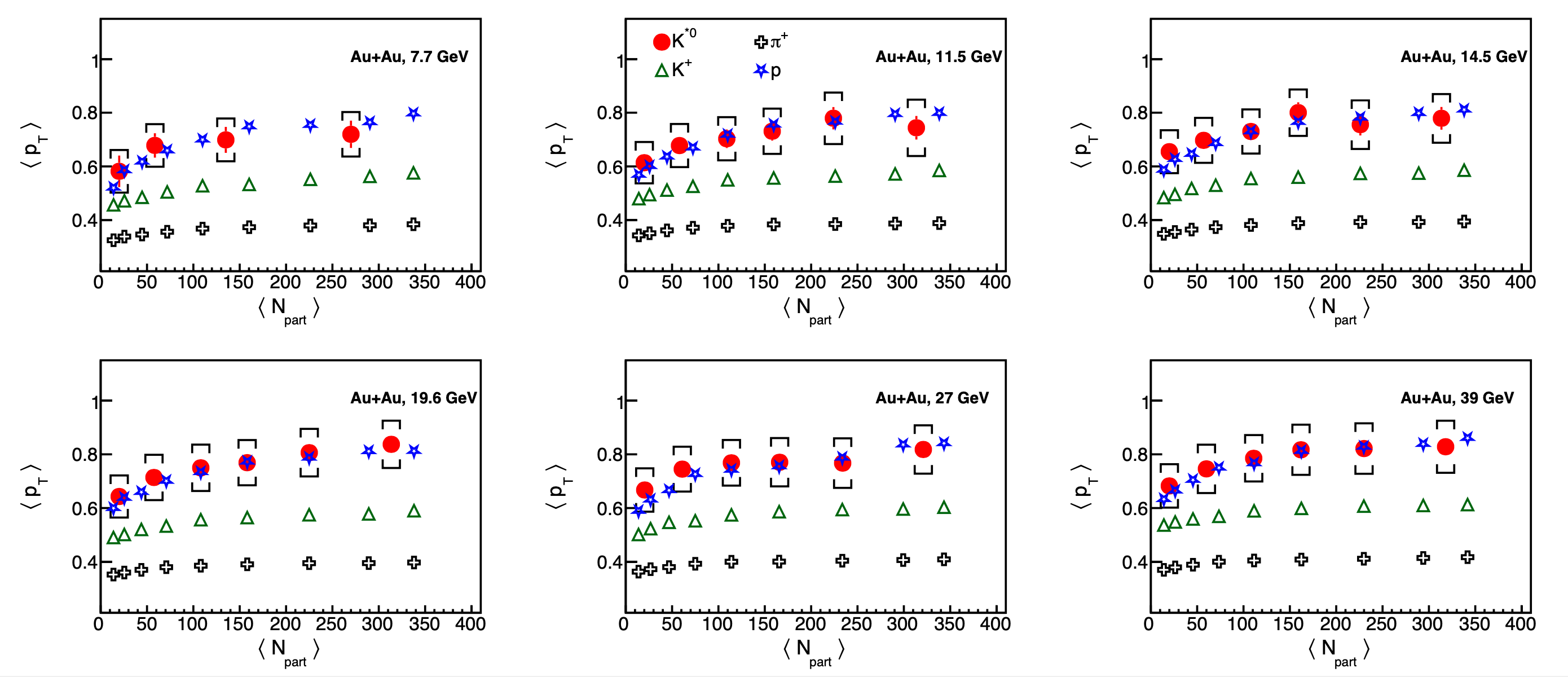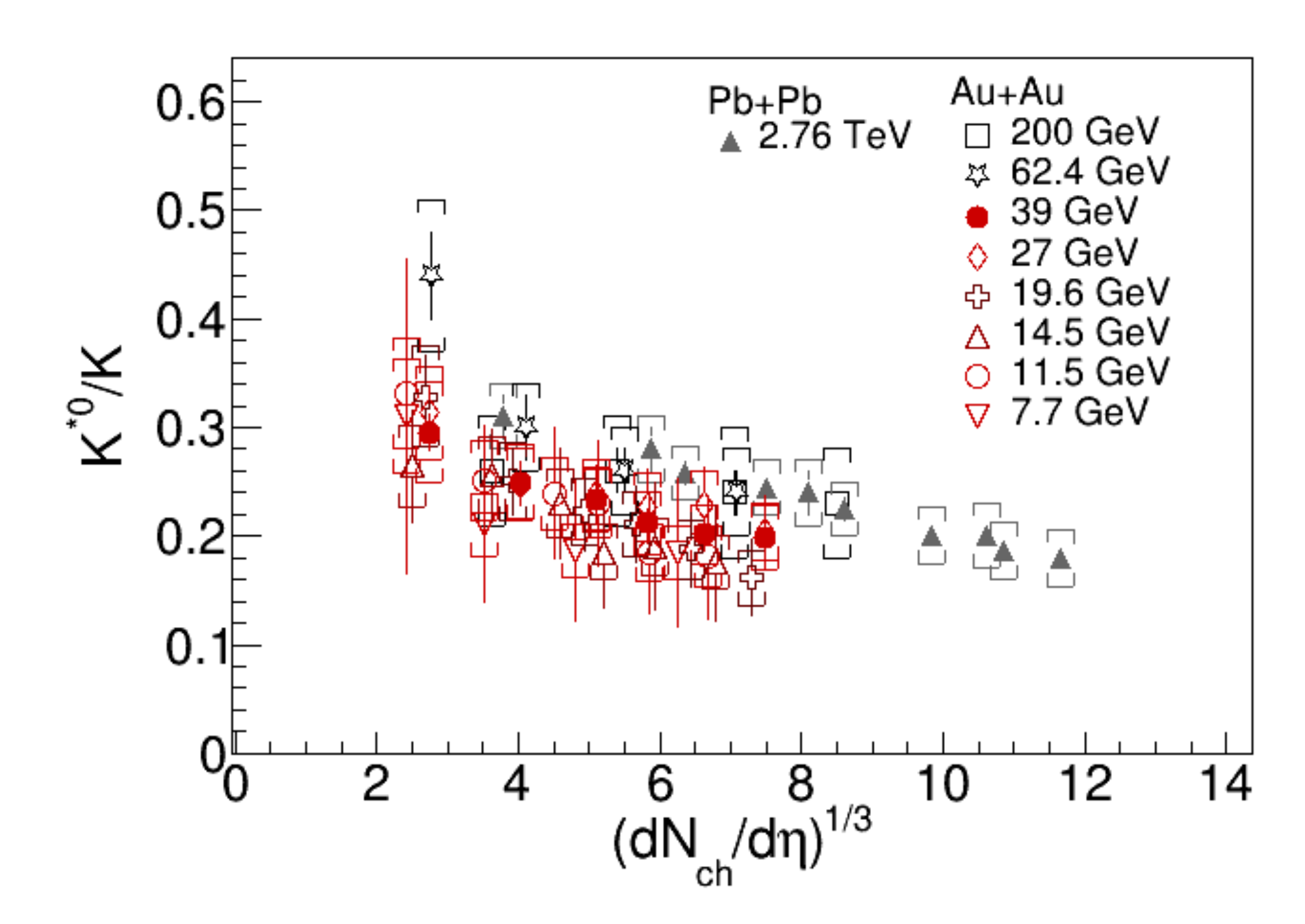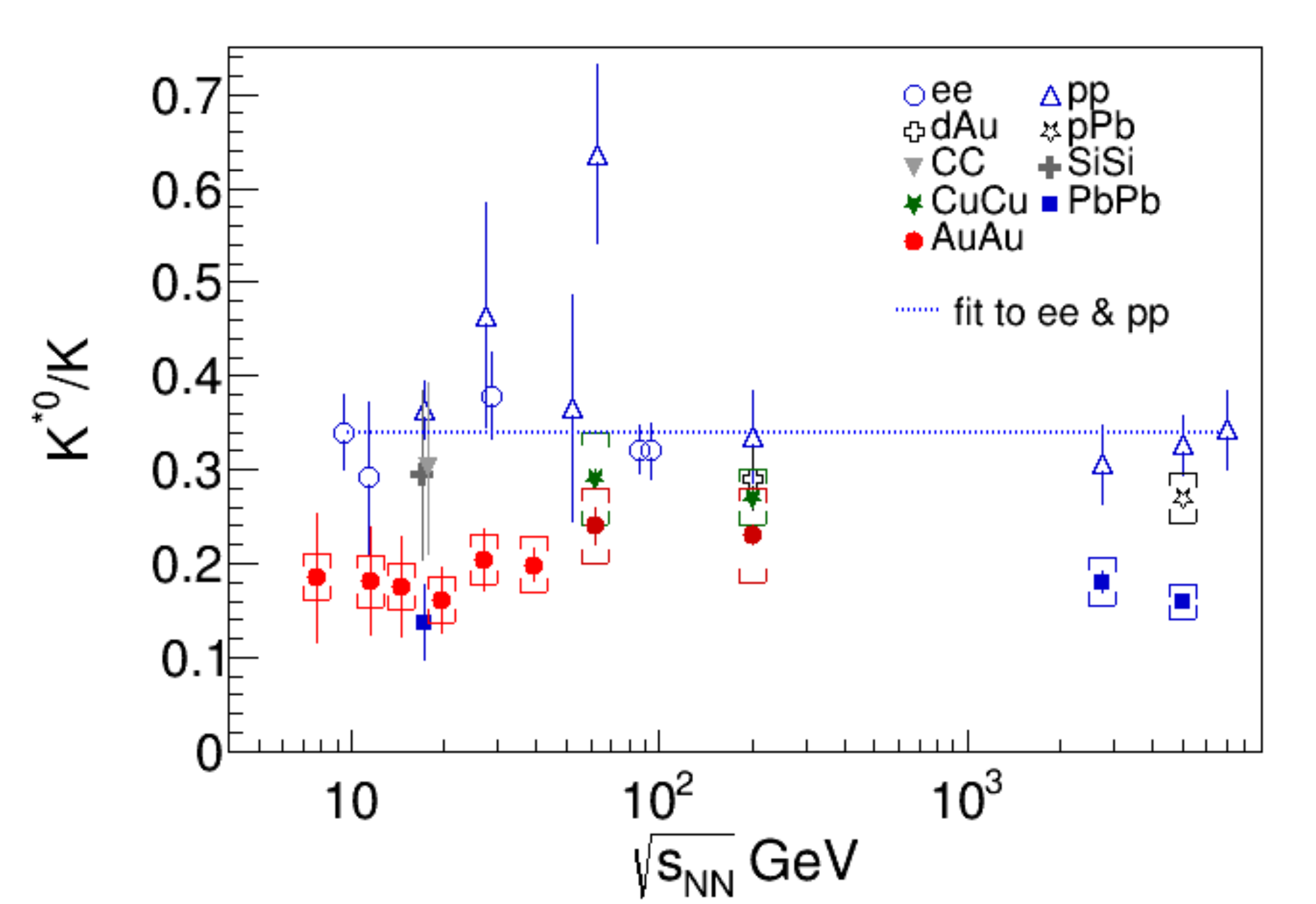K*0 production in RHIC beam energy scan Au+Au collisions at \sqrt{s_{NN}} = 7.7 - 39 GeV
Title: K*0 production in RHIC beam energy scan Au+Au collisions at √sNN = 7.7 - 39 GeV
PAs: Aswini Kumar Sahoo, Subhash Singha, Md Nasim
Target journal: Phys. Rev. C
-----------------------------------------------------------------------------------------------
-----------------------------------------------------------------------------------------------
Abstract:
We report the measurements of K*0 meson at midrapidity (|y|< 1.0) in Au+Au collisions at √sNN = 7.7, 11.5, 14.5, 19.6, 27 and 39 GeV from the STAR experiment at the RHIC beam energy scan (BES) program. The transverse momentum (pT) spectra, yield (dN/dy) and average transverse momentum (<pT>) of K*0 are presented as functions of collision centrality and beam energy. The K*0/K yield ratio are presented for different collision centralities and beam energies. The K*0/K ratio in heavy ion collisions are observed to be smaller than the same in e+e and p+p collisions. The K*0/K ratio follow similar centrality dependent trend observed by previous RHIC and LHC measurements. The data favor the scenario of dominance of hadronic re-scattering over regeneration in between kinetic and chemical freeze-out at BES energies.
Summary:
We presented the transverse momentum (pT) spectra, yield (dN/dy), average transverse momentum (<pT>) of K*0 in using the RHIC beam energy scan Au+Au collision data at √sNN = 7.7-39 GeV. For all BES energies the K*0 <pT> is comparable to that of protons, indicating mass dependence of <pT>. The K*0/K ratio in central Au+Au collisions is smaller than the same in peripheral and e+e and p+p collision data. The centrality dependent of K*0/K ratio follow the same trend observed by previous RHIC and LHC measurements. The data supports the scenario of dominance of hadronic re-scattering over regeneration at BES energies.
Proposed Figures::
.png)
Fig 1: Κπ invariant mass distribution for central and peripheral in Au+Au collisions at √sNN = 19.6 and 39 GeV. The solid line indicate the Breit Wigner fit and the dashed line represent the residual background.

Fig 2: K*0 reconstruction efficiency x acceptance as functions pT in Au+Au collisions for different centralities for √sNN = 7.7, 11.5, 14.5, 19.6, 27 and 39 GeV.

Fig 3: K*0 pT spectra at midrapidity (|y|<1.0) in Au+Au collisions at √sNN = 7.7, 11.5, 14.5, 19.6, 27 and 39 GeV for different centralities. The solid line indicate the Tsallis fit and the dashed line represent the extrapolation to low pT.

Fig 4: The midrapidity yields (dN/dy) of K*0 as functions of number of participating nucleons (<Npart>) in Au+Au collisions at √sNN = 7.7, 11.5, 14.5, 19.6, 27 and 39 GeV.

Fig 5: The midrapidity mean pT (< pT >) of K*0 as function of number of participating nucleons (<Npart>) in Au+Au collisions at √sNN= 7.7, 11.5, 14.5, 19.6, 27 and 39 GeV.

Fig: 6: The midrapidity mean pT (< pT >) of π, Κ, p and K*0 as function of number of participating nucleons (<Npart>) in Au+Au collisions at √sNN = 7.7, 11.5, 14.5, 19.6, 27 and 39 GeV.

Fig 7: The K*0/K ratio as function of (dNch/dη)1/3 in Au+Au collisions at √sNN = 7.7, 11.5, 14.5, 19.6, 27 and 39 GeV. The results are compared to previous measurements from STAR and ALICE.

Fig 8: The K*0/K ratio as functions of beam energy in e+e, p+p, d+A, p+A and central A+A collisions. The dashed line indicate the fit to e+e and p+p data.
Figure pdf files:
https://drupal.star.bnl.gov/STAR/blog/aswini96/K0besIpaperdraftplots
PWGC preview presentation :: KStar_spectra_8Oct_2021.pdf
Notes from PWGC: https://drupal.star.bnl.gov/STAR/event/2021/10/08/star-pwgc-meeting#comment-2070
Response to PWGC comments: KStar_spectra_PWGC_suggestions_25Oct2021.pdf
Analysis Note:
STAR Note: psn0784
version-0 [kstar_note_pwg_review_ver0.pdf]
Paper Draft:
version-4:[kstar_draft_CollabReview_ver1.pdf] [Released for collaboration review]
version-3 [kstar_draft_GPC_ver3.pdf]
version-2 [kstar_draft_GPC_ver2.pdf]
version-1 [kstar_draft_GPC_ver1.pdf]
version-0 [kstar_draft_pwg_review_ver0.pdf]
Analysis Code: [/gpfs01/star/pwg/aswini96/Code_QA_Kstar_BES_1/]
CVS: https://www.star.bnl.gov/cgi-bin/protected/viewvc.cgi/cvsroot/offline/paper/psn0784/
GPC Discussions:
1. Round-1-Comments and responses:
2. GPC meeting minutes: https://drupal.star.bnl.gov/STAR/blog/zbtang/minutes-GPC331-BES-K-1st-zoom-meeting
3. Cross-checks:
m2 fitting at the highest pT bin: https://drupal.star.bnl.gov/STAR/system/files/kaon_last_pt.pdf
ZDCx dependence of tof-match efficiency:
https://drupal.star.bnl.gov/STAR/system/files/19gev_pion_tofmatch_pion.pdf
https://drupal.star.bnl.gov/STAR/system/files/19gev_pion_tofmatch_kaon.pdf
4. Round-2- Comments from Richard Witt: kstar_draft_GPC_ver1_RWitt_Comments.pdf
Comments and responses (Google doc)
Response to GPC:
Reply: https://drupal.star.bnl.gov/STAR/system/files/Response_to_GPC_Comments_round2.pdf
Paper draft: https://drupal.star.bnl.gov/STAR/system/files/kstar_draft_GPC_ver2.pdf
AN: https://drupal.star.bnl.gov/STAR/system/files/Analysis_Note_Kstar_ver2.pdf
Supporting documents::
QM 2017:
https://www.star.bnl.gov/protected/bulkcorr/subhash/rsn/ppts/Kstar_BES_2017_LFS.pdf
https://www.star.bnl.gov/protected/bulkcorr/subhash/rsn/ppts/Kstar_BES_2017_BulkCorr.pdf
https://www.star.bnl.gov/protected/bulkcorr/subhash/rsn/qm2017/QM17_poster_Subhash_ver8.pdf
Resonance workshop Bergamo:
https://drupal.star.bnl.gov/STAR/system/files/resonance_bergamo_ver6.pdf
SQM 2019:
https://drupal.star.bnl.gov/STAR/system/files/sqm2019_ver5.pdf
https://drupal.star.bnl.gov/STAR/system/files/draft_7.pdf
LFSUPC:
STARCollaborationMeeting_Aswini.pdf
https://drupal.star.bnl.gov/STAR/system/files/KStar_spectra_Aug20_2021_0.pdf
https://drupal.star.bnl.gov/STAR/system/files/slide2_0.pdf
https://drupal.star.bnl.gov/STAR/system/files/slide1.pdf
https://drupal.star.bnl.gov/STAR/system/files/slide_0.pdf
- subhash's blog
- Login or register to post comments
